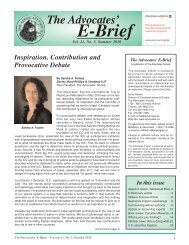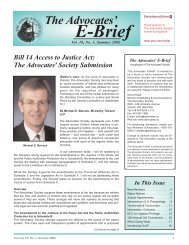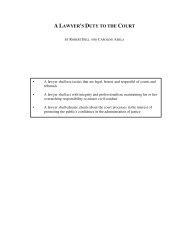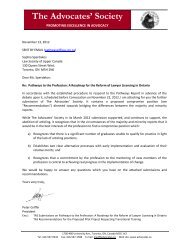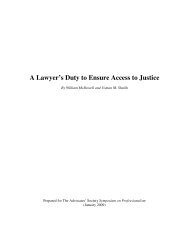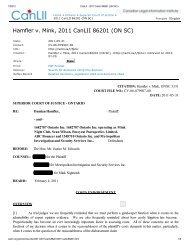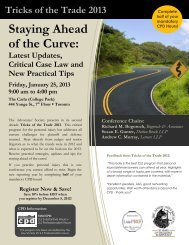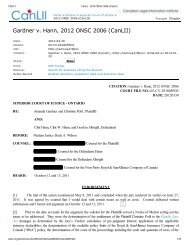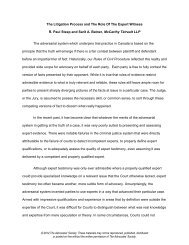E-BRIEF - Jan-Feb 2004 - The Advocates' Society
E-BRIEF - Jan-Feb 2004 - The Advocates' Society
E-BRIEF - Jan-Feb 2004 - The Advocates' Society
You also want an ePaper? Increase the reach of your titles
YUMPU automatically turns print PDFs into web optimized ePapers that Google loves.
<strong>The</strong> Expert Column<br />
Global Economic Crime Survey<br />
2003 - Canadian Results<br />
By Steven Henderson<br />
Economic crime<br />
continues to be a<br />
menace to businesses<br />
throughout<br />
the world despite<br />
widespread coverage<br />
in the press<br />
and government<br />
and regulators'<br />
efforts to reduce<br />
Steven Henderson fraud. Over onethird<br />
of companies<br />
were victims of fraud in the last two<br />
years, suffering an average loss of over<br />
US $2 million, according to the<br />
PricewaterhouseCoopers Investigations<br />
& Forensic Services' Global Economic<br />
Crime Survey 2003. In Canada, almost<br />
one half of the companies surveyed<br />
reported being a victim of an economic<br />
crime in the past two years.<br />
<strong>The</strong> Global Economic Crime Survey<br />
2003 represents the minimum benchmark<br />
for economic crime. <strong>The</strong>re are<br />
frauds that organizations never uncover,<br />
while others are treated as commercial<br />
losses. Additionally, there is bound to be<br />
a reluctance to divulge certain frauds<br />
that occur. Despite this, there remain<br />
some valuable lessons to be learned<br />
from this survey. Most notably, it reveals<br />
that in Canada approximately one-fifth of<br />
fraud cases were uncovered by accident<br />
or chance. Inasmuch as this statistic<br />
lends credence to the view that controls<br />
can never eliminate fraud completely,<br />
about one-half of respondents both globally<br />
and in Canada reported the fraud<br />
was uncovered as a result of the work of<br />
internal and external audit. <strong>The</strong> survey<br />
reveals the impact on a company's reputation,<br />
brand image and staff morale can<br />
be more important than the direct financial<br />
loss. Respondents assign primary<br />
responsibility for managing economic<br />
crime issues to the board of directors,<br />
followed closely by senior members of<br />
management. Overall the survey results<br />
reinforce the need for companies in<br />
Canada to develop a proactive anti-fraud<br />
regime founded on vulnerability assessment,<br />
communication, training, testing<br />
10<br />
QuickFIND is an award-winning desktop productivity tool for<br />
retrieving caselaw.<br />
QuickFIND lets you find or note up cases from citations in memos,<br />
email messages, factums, web pages, and other documents<br />
— immediately.<br />
Now you can access caselaw faster and<br />
more efficiently than ever. For pricing<br />
information, call 1-800-387-0899 or<br />
email sales@quicklaw.com.<br />
and fraud response planning.<br />
Types of Economic Crime<br />
Asset misappropriation, generally the<br />
easiest to detect as it often involves the<br />
theft of tangible assets with a defined<br />
value, is the single most commonly<br />
reported economic crime. Further insights<br />
can be gained by comparing the perceived<br />
prevalence with the actual number<br />
of incidents. Globally, corruption and<br />
bribery are perceived to be the most<br />
prevalent, however asset misappropriation<br />
has the highest number of incidents<br />
reported. In Canada approximately 40%<br />
of companies consider asset misappropriation<br />
to be the most prevalent with<br />
almost the same percentage of incidents<br />
reported.<br />
Financial misrepresentation is perceived<br />
to be prevalent both in Canada and on a<br />
global basis even though the number of<br />
incidents reported is less than 5%. With<br />
financial misrepresentation, this gap<br />
appears to reflect two factors: higher<br />
awareness following the corporate scandals<br />
in North America and Europe and<br />
an understanding that it is likely to have<br />
a dramatic impact on a business.<br />
Looking to the future, a majority of companies<br />
expect fraud to increase in the<br />
next five years. Over half of Canadian<br />
companies or one-third of global companies<br />
expect their greatest fraud risk to<br />
www.quicklaw.com<br />
LexisNexis and the Knowledge Burst logo are trademarks of Reed Elsevier Properties Inc., used under licence.<br />
Quicklaw and QuickFIND are trademarks of LexisNexis Canada Inc. Copyright 2003 LexisNexis Canada Inc. All rights reserved.<br />
continue to be asset misappropriation,<br />
followed closely by cybercrime, which<br />
primarily involves computer hacking,<br />
virus attacks, denial of service and theft<br />
of electronic data.<br />
<strong>The</strong> Collateral Damage<br />
Fraud can affect organizations in many<br />
ways, not solely in terms of direct financial<br />
losses. <strong>The</strong> indirect costs associated<br />
with staff morale, damage to the reputation<br />
of the organization and the erosion<br />
of shareholder value must be taken into<br />
account. Approximately half of companies,<br />
both globally and in Canada,<br />
reported that economic crime had the<br />
greatest impact on staff morale and motivation.<br />
Less than 5% of Canadian companies<br />
reported that economic crime<br />
impacted the share price despite the fact<br />
that approximately one-fifth indicated it<br />
affected their reputation and business<br />
relationships. <strong>The</strong> markets' lack of knowledge<br />
about fraud or the avoidance of<br />
adverse publicity may explain this, but<br />
many well-publicized cases clearly<br />
demonstrate the sensitivity of markets to<br />
management fraud.<br />
Detecting Economic Crime<br />
<strong>The</strong> perpetrators of fraud invariably take<br />
great pains to conceal or remove evidence<br />
of their crimes. It is not possible to<br />
accurately gauge how much fraud goes<br />
(Continued on page 11)<br />
VOLUME 15, NO. 5, JANUARY/FEBRUARY <strong>2004</strong>



